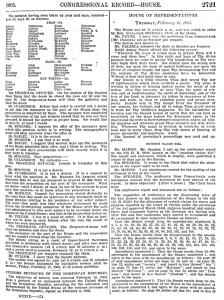Contributor(s): Shared on: 2 April 2019 under the Public Domain (17 U.S. Code §105 - Subject matter of copyright: United States Government works) Categories: Tags:
Guest Chaplain: Rabbi Abram Simon
Date of Prayer: 02/16/1905 | Contribute a translation | Source (English) |
|---|
בְּכָל־הַמָּקוֹם אֲשֶׁר אַזְכִּיר אֶת־שְׁמִי
אָבוֹא אֵלֶיךָ וּבֵרַכְתִּיךָ׃ (שמות כ:כא)
|
“Wherever My name is called upon in prayer
there will I come and bless thee.” | |
In this spirit and hope of Thy divine promise
have we come to invoke Thy benediction
as Thy servants begin their daily tasks.
Not reliant upon the strong arm of flesh,
nor upon the flash of mental brilliance,
nor upon the fervor of eloquent tongue,
but upon Thy encompassing love
and the majesty of Thy divine assurance
have we assembled.
Without it
they that build
labor in vain. | |
Our history is a Bible wherein Thou dost reveal
Thy law of righteousness which alone exalteth a people.
Thy name is written in letters of flaming justice
across the heart of our nation. | |
Give Thy servants, we pray Thee,
the spirit of wisdom and of understanding,
the spirit of knowledge and of the fear of the Lord,
to interpret its letters in characters of freedom and truth,
in lines of enduring peace and secure prosperity.
Include ever in Thy benign favor
the President of our country,
his Cabinet,
and all to whom Thou givest power in trust
for Thy children’s happiness. | |
To the institutions of learning
and the blessed homes of mercy
that dot our land as beautifully
as the stars bedeck the firmament above,
to the church and the state in their fortunate separation,
and to all helpful impulses and interests
grant Thou strength and wise direction. | |
Wherever Thy name is invoked in sincerity,
in every land and in every clime,
drop Thy rich crown of blessing,
of peace, prosperity, and happiness. | |
Amen. |
Source(s)58th Congress, 3rd Session, February 16, 1905 
The Congressional Record is the official record of the proceedings and debates of the United States Congress, published by the United States Government Printing Office and issued when Congress is in session. Indexes are issued approximately every two weeks. At the end of a session of Congress, the daily editions are compiled in bound volumes constituting the permanent edition. Statutory authorization for the Congressional Record is found in Chapter 9 of Title 44 of the United States Code. ( wikipedia)  Abram Simon (1872–1938), was a rabbi and leader in the Reform movement in the early 20th century. Born in Nashville, Tennessee, he was educated at the University of Cincinnati where he earned his B.A. in 1894, the same year he was ordained by Hebrew Union College. Upon ordination he served as rabbi of B'nai Israel Congregation in Sacramento and then as rabbi of Temple Israel in Omaha, Nebraska (1899–1904). In 1903 he was elected as the first rabbi of Washington Hebrew Congregation in Washington, D.C.. In Washington, Simon became a communal leader. In addition to the Board of Education he was a trustee and later president of the Columbia Hospital for Women and also president of the Public Library of Washington. Rabbi Simon was a member of the Red Cross during World War I, broadcast radio lectures, and was president of both the Board of Education in Washington as well as the Conference of Christians and Jews. He was a founding member of the Reform movement's Committee on Jewish Education. Simon launched the National Committee on Religion, which boosted synagogue attendance and set up Hebrew schools. In 1917, Simon earned a Ph.D. from George Washington University, writing on the "The Constructive Character and Function of Religious Progress." He was president of the Central Conference of American Rabbi from 1923 to 1925, a founder and later president of the Synagogue Council of America. He was an early enthusiast of women's participation in the synagogue. Fay Sonnenreich recalled that in 1920, with his permission, she and another young girl sat in the pulpit, held the Torah and read from it. "I still remember the shocked expressions on the faces of the congregation," she recalled many years later. "Dr. Simon told us afterwards that the board of trustees was angry with him for permitting girls to participate in what traditionally belonged to the men. But he believed in developing the potential of each individual, and his encouragement made a lasting impact upon our lives." Read a comment / Leave a comment (moderated) Works of related interest: |







Leave a Reply